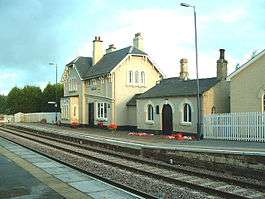Hensall railway station
| Hensall | |
|---|---|
 | |
| Location | |
| Place | Hensall |
| Local authority | Selby |
| Coordinates | 53°41′55″N 1°06′52″W / 53.698500°N 1.114500°WCoordinates: 53°41′55″N 1°06′52″W / 53.698500°N 1.114500°W |
| Grid reference | SE585228 |
| Operations | |
| Station code | HEL |
| Managed by | Northern |
| Number of platforms | 2 |
| DfT category | F2 |
|
Live arrivals/departures, station information and onward connections from National Rail Enquiries | |
| Annual rail passenger usage* | |
| 2010/11 |
|
| 2011/12 |
|
| 2012/13 |
|
| 2013/14 |
|
| 2014/15 |
|
| History | |
| Key dates | Opened 1848 |
| National Rail – UK railway stations | |
| * Annual estimated passenger usage based on sales of tickets in stated financial year(s) which end or originate at Hensall from Office of Rail and Road statistics. Methodology may vary year on year. | |
|
| |
Hensall railway station serves the village of Hensall, North Yorkshire, England. It is located on the Pontefract Line and is 22 miles (35 km) east of Leeds. The line is used regularly by the freight companies FirstGBRf, Freightliner and DB Schenker that transport coal & limestone to Drax and remove the gypsum created by the flue-gas treatment equipment. The branch line to the power plant diverges just to the east of the station and is supervised from the nearby signal box.
History
The station was built by the Wakefield, Pontefract and Goole Railway, a constituent company of the Lancashire and Yorkshire Railway; the route through here opening to traffic in 1848. Later in its history the station was absorbed into the LMSR London Midland and Scottish Railway before it became part of the British Railways network in 1948. Today the station is operated by Northern. The station is now home to one of the last sets of electrical wheel boom gates in the world, Castleford Cutsyke Junction and Hensall are the final serving gates after the removal of the gates at Brough. Hensall Signal box (located adjacent the south platform) has recently been awarded grade II listing status along with 25 other historical signal boxes. The list, announced by the Department for Culture, Media and Sport, includes signal boxes dating from late-Victorian times.[1]
Hensall Station was also the site of a small collision in 1949 between a British Railways freight engine and a lorry after failure of a crossing keeper to acknowledge the train and brake van approaching, however it was argued that the signal man never gave the crossing the approaching train signal. It is unknown who caused the incident.[2]
Services
Hensall has only a limited service - Monday to Saturdays, one train a day goes to Goole and two per day go to Leeds.[3] There is no Sunday service. This service is operated by Northern and is booked to be run with classes 142, 144, 153 or 150 Diesel Multiple Units.
There was a more frequent service in place in the 1970s & 80s (5-6 trains per day each way - see Table 32 of the 1979, 1985 & 1988 National Passenger timetables for more details), but the timetable was cut in half in 1991 due to a rolling stock shortage and to the present minimal level in 2004. The remaining trains are operated primarily to meet Northern's franchise commitments and to avoid the need for both the station and the Knottingley to Goole line to be put through the formal closure process.[4]
References
- ↑ "Rare Yorkshire signal boxes are given listed status". Yorkshire Evening Post. Retrieved 9 December 2013.
- ↑ Brigadier C A Langley (4 May 1949). "REPORT ON THE ACCIDENT" (PDF). Railways Archive. Ministry of Transport. p. 5. Retrieved 23 November 2015.
- ↑ GB eNRT, May 2016 Edition, Table 32
- ↑ "The ghost trains haunting Britain’s rail network" Freeman, Sarah, Yorkshire Post article 28 April 2015; Retrieved 20 July 2016.
External links
- Train times and station information for Hensall railway station from National Rail
- Historic England. "Hensall Signal Box (1412058)". National Heritage List for England.
| Preceding station | Following station | |||
|---|---|---|---|---|
| Northern Pontefract Line Mondays-Saturdays only |